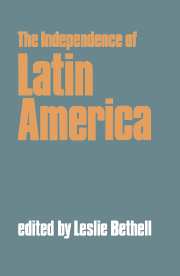Book contents
- Frontmatter
- Contents
- List of maps
- Preface
- 1 The origins of Spanish American Independence
- 2 The Independence of Mexico and Central America
- 3 The Independence of Spanish South America
- 4 The Independence of Brazil
- 5 International politics and Latin American Independence
- A note on the Church and the Independence of Latin America
- Bibliographical essays
- Index
5 - International politics and Latin American Independence
Published online by Cambridge University Press: 05 June 2012
- Frontmatter
- Contents
- List of maps
- Preface
- 1 The origins of Spanish American Independence
- 2 The Independence of Mexico and Central America
- 3 The Independence of Spanish South America
- 4 The Independence of Brazil
- 5 International politics and Latin American Independence
- A note on the Church and the Independence of Latin America
- Bibliographical essays
- Index
Summary
The political and military struggles which resulted in the independence of the Latin American nations were, from the outset, a matter of concern to the whole of the European and Atlantic state system of which the Spanish and Portuguese colonies formed an integral part. This was no new interest. From the sixteenth century the fabulous wealth of the Indies had attracted the envy of other European nations, who aspired both to obtain a share of it for themselves and to deny any advantage from it to their rivals. During the eighteenth century the Family Compact between the Bourbon monarchies of Spain and France emerged as a threat to Britain. But the British offset this advantage quite effectively through an extensive clandestine trade with Spanish America; no serious attempt was made to annex any major Spanish colony to their own empire.
The stately minuet of mercantilist colonial rivalry was, however, disrupted by disturbing developments in the 1790s. The French Revolution introduced new political principles into international relations; the slave rebellion in Saint-Domingue sent a shudder of fear through all the plantation colonies of the New World; Spanish American Creole dissidents, of whom Francisco de Miranda was the most outstanding, propagandized throughout Europe in favour of the emancipation of the American colonies from Spanish rule. More specifically, the extreme submission of the weak Spanish monarchy to France, which involved Spain in war against Britain in 1796 and again, after a brief truce, in 1804, led the British government to consider measures against Spain's imperial possessions.
- Type
- Chapter
- Information
- The Independence of Latin America , pp. 195 - 226Publisher: Cambridge University PressPrint publication year: 1987
- 9
- Cited by



